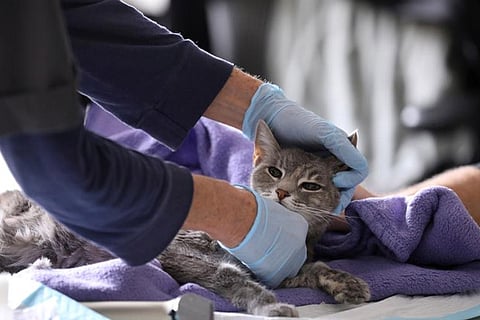

Chennai
Cats, however, do develop a strong, protective immune response, which may make them worth studying when it comes to human vaccines. There is still no evidence to suggest that pets have passed the virus to humans, although cats do shed the virus and infect other cats.
Infected dogs in the new study didn’t produce the virus in their upper respiratory tracts and didn’t shed it at all, although some other studies have found different results. Neither the cats nor the dogs in the study showed any illness.
The authors of the report in the Proceedings of the National Academy of Sciences published on Tuesday point to real world transmission to emphasize why pets are not a significant concern for human infection.
Angela M. Bosco-Lauth, Airn E. Hartwig, Stephanie M. Porter and other researchers at Colorado State University’s College of Veterinary Medicine and Biomedical Sciences note that while millions of humans have been infected with the virus worldwide and 1 million have died, there are only a handful of reports of pets that have become infected naturally. If cats can shed the virus, why aren’t they infecting people, which is a theoretical possibility? One reason is that the number of humans who have contracted the virus is so large, and they are the ones giving it to cats.
Another possible reason is that infection in everyday life is very different from infection in the lab. In the new experimental work, scientists inserted pipettes in the nasal cavities of cats and dogs to give them the virus. The animals received anaesthesia before the procedure, but the point is that this doesn’t happen in most homes.
Later, other cats were put into close contact with the infected cats, who were shedding virus. Does this happen in the real world?
There is some evidence of street cats in Wuhan, China, having been exposed to the virus. But it may be that in the United States, because many cats are kept indoors, transmission is minimal. Or, Dr. Bosco-Lauth said, cat infection with the virus could be relatively common without humans noticing, because of a lack of symptoms. “Those cats that were infected in the experiment?” she said. “You would never have known.” Cats might also pass the virus on to wildlife.
Dr. Bosco-Lauth said that an as yet unpublished work shows that deer mice may become infected with the novel coronavirus. Also, outside a lab, infection depends mainly on breathing in viral particles from an infected person and normal contact doesn’t necessarily translate into infection for animals. Ferrets have been shown in the laboratory to be susceptible to infection with the virus, and to spread it to other ferrets.
But scientists at Tufts reported, in a paper that has yet to be peer- reviewed, that in one house with 29 pet ferrets and two humans with Covid not one ferret became infected with the virus. The Colorado State researchers advise keeping cats indoors, particularly if a human in a household has become infected, because they could spread it to other cats.
Also, if a person with Covid needs to be admitted to a hospital and has pet cats, Dr. Porter suggested, the cat’s caretakers should know to observe social distancing as they would with a person.
James Gorman is a science writer at large with NYT©2020
The New York Times
Visit news.dtnext.in to explore our interactive epaper!
Download the DT Next app for more exciting features!
Click here for iOS
Click here for Android